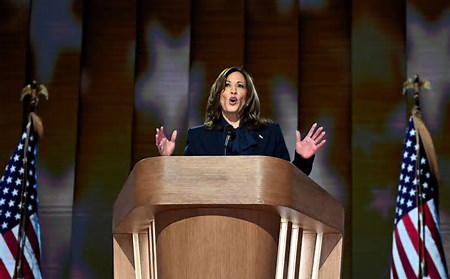Photo Credit: BBC News
Vice President Kamala Harris’s DNC speech attempted to completely reverse and spin the failed Biden-Harris administration, amounting to little more than fantasy. While she spoke of fairness and opportunity, the reality of the policies she champions contradict these ideals, fostering division and imposing government overreach. Her speech glossed over the genuine concerns of millions of Americans who feel left behind by an administration more focused on woke ideological conformity than on addressing the real issues facing our nation.
Harris, 59, replaced Biden, 81, after the current President’s disastrous first debate with Donald Trump. The Vice President will face President Trump in a second debate on September 10 in Philadelphia. Last week Harris revealed that she favors a corporate tax hike to 28%. Besides this idea, little policy specifics have emerged from the nascent Harris-Walz campaign. The country will certainly expect more policy clarifications by September 10, if not before.
Vice President Harris framed her acceptance speech around her personal story, weaving in her experience as a prosecutor, a senator, and the daughter of immigrants. She spoke about racial injustice, the need for criminal justice reform, and the importance of voting rights. While important, her rhetoric seemed more focused on energizing the progressive wing of the Democratic Party than addressing the broader concerns of Americans who feel left out by the current political climate.
The speech had a glaring omission: it did not offer any meaningful outreach to moderates or conservatives. The nation does not just grapple with issues of race and inequality; it also faces economic uncertainty, unchecked immigration, a crisis of faith in institutions, and a growing polarization that continues to pull communities apart. Wars in Europe and the Middle East continue unabated, as tensions mount between North and South Korea as well as China and Taiwan. Instead of addressing these broader with clarity and depth, Harris doubled down on the Democratic Party’s progressive agenda, which has alienated many Americans who feel their values and way of life under attack.
While we expected her criticism of President Trump and his administration, it lacked nuance and meaning. The mantra of the Evil Donald Trump vs. Kamala Harris, For the People, just does not cut it. She painted a picture of an America that is solely defined by division, injustice, and inequality under his leadership. Yet millions of Americans believe that the Trump presidency delivered on its promises of economic growth, deregulation, energy independence, and a focus on law and order—issues that Harris barely touched on. Moreover, her emphasis on identity politics may have resonated with the Democratic base, but it risks deepening the divides that already exist in this country. “Saving democracy” does not mean eliminating points of view that differ from the Democrat agenda.
For example, many conservatives see the focus on identity as a distraction from the real issues facing Americans today, such as job creation, education reform, and national security. By centering her speech around race and gender, Harris missed an opportunity to build bridges and present a message that could resonate with a broader audience.
Harris’s track record as a prosecutor also raises questions about her commitment to the very reforms she now advocates. While she spoke about the need for criminal justice reform, her tenure as California’s attorney general is marked by decisions that many on the left criticize as being too tough on crime. This inconsistency undermines her credibility and raises questions about her true convictions.
And what did she do, exactly, as our phantom Vice President? Did not the same problems exist over the last four years of the Biden-Harris administration? Why did they get neglected and how can we expect anything different from yet another vague iteration of Obama, Biden, and Harris “hope and change”?
Ultimately, Harris’s DNC acceptance speech sang like a rallying cry for progressives, but it fell short in addressing the concerns of middle America. At a time when the country yearns for unity and leadership that can bridge the divides, Harris missed a chance to offer a vision that could bring Americans together. Instead, she delivered a message that will likely solidify her support among the Democratic base but do little to win over the moderate and conservative voters who will remain critical in the upcoming election.
For a candidate who aspires to be our next President, Kamala Harris’s speech proved a missed opportunity to show that she could lead not just the Democratic Party, but the entire nation. Conservatives remain skeptical that Harris-Walz campaign can truly unite the country when their message continues to focus more on division than on common ground. In the end, and in November, Americans will decide the best vision for their own future and choose reality over fantasy.




